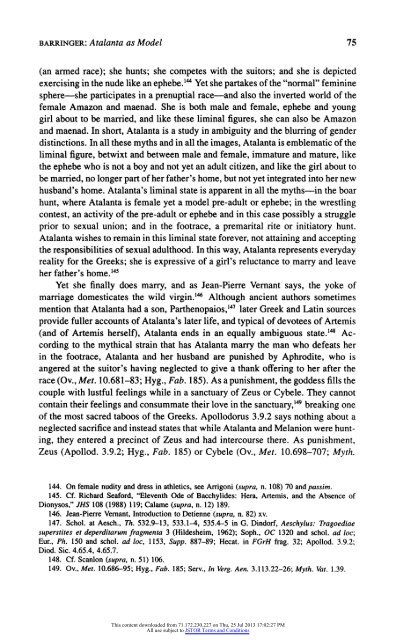Atalanta as Model: The Hunter and the Hunted - Robert Bedrosian's ...
Atalanta as Model: The Hunter and the Hunted - Robert Bedrosian's ...
Atalanta as Model: The Hunter and the Hunted - Robert Bedrosian's ...
Create successful ePaper yourself
Turn your PDF publications into a flip-book with our unique Google optimized e-Paper software.
BARRINGER: <strong>Atalanta</strong> <strong>as</strong> <strong>Model</strong> 75<br />
(an armed race); she hunts; she competes with <strong>the</strong> suitors; <strong>and</strong> she is depicted<br />
exercising in <strong>the</strong> nude like an ephebe.44 Yet she partakes of <strong>the</strong> "normal" feminine<br />
sphere-she participates in a prenuptial race-<strong>and</strong> also <strong>the</strong> inverted world of <strong>the</strong><br />
female Amazon <strong>and</strong> maenad. She is both male <strong>and</strong> female, ephebe <strong>and</strong> young<br />
girl about to be married, <strong>and</strong> like <strong>the</strong>se liminal figures, she can also be Amazon<br />
<strong>and</strong> maenad. In short, <strong>Atalanta</strong> is a study in ambiguity <strong>and</strong> <strong>the</strong> blurring of gender<br />
distinctions. In all <strong>the</strong>se myths <strong>and</strong> in all <strong>the</strong> images, <strong>Atalanta</strong> is emblematic of <strong>the</strong><br />
liminal figure, betwixt <strong>and</strong> between male <strong>and</strong> female, immature <strong>and</strong> mature, like<br />
<strong>the</strong> ephebe who is not a boy <strong>and</strong> not yet an adult citizen, <strong>and</strong> like <strong>the</strong> girl about to<br />
be married, no longer part of her fa<strong>the</strong>r's home, but not yet integrated into her new<br />
husb<strong>and</strong>'s home. <strong>Atalanta</strong>'s liminal state is apparent in all <strong>the</strong> myths-in <strong>the</strong> boar<br />
hunt, where <strong>Atalanta</strong> is female yet a model pre-adult or ephebe; in <strong>the</strong> wrestling<br />
contest, an activity of <strong>the</strong> pre-adult or ephebe <strong>and</strong> in this c<strong>as</strong>e possibly a struggle<br />
prior to sexual union; <strong>and</strong> in <strong>the</strong> footrace, a premarital rite or initiatory hunt.<br />
<strong>Atalanta</strong> wishes to remain in this liminal state forever, not attaining <strong>and</strong> accepting<br />
<strong>the</strong> responsibilities of sexual adulthood. In this way, <strong>Atalanta</strong> represents everyday<br />
reality for <strong>the</strong> Greeks; she is expressive of a girl's reluctance to marry <strong>and</strong> leave<br />
her fa<strong>the</strong>r's home.'45<br />
Yet she finally does marry, <strong>and</strong> <strong>as</strong> Jean-Pierre Vernant says, <strong>the</strong> yoke of<br />
marriage domesticates <strong>the</strong> wild virgin.46 Although ancient authors sometimes<br />
mention that <strong>Atalanta</strong> had a son, Par<strong>the</strong>nopaios,'47 later Greek <strong>and</strong> Latin sources<br />
provide fuller accounts of <strong>Atalanta</strong>'s later life, <strong>and</strong> typical of devotees of Artemis<br />
(<strong>and</strong> of Artemis herself), <strong>Atalanta</strong> ends in an equally ambiguous state.'4 Ac<br />
cording to <strong>the</strong> mythical strain that h<strong>as</strong> <strong>Atalanta</strong> marry <strong>the</strong> man who defeats her<br />
in <strong>the</strong> footrace, <strong>Atalanta</strong> <strong>and</strong> her husb<strong>and</strong> are punished by Aphrodite, who is<br />
angered at <strong>the</strong> suitor's having neglected to give a thank offering to her after <strong>the</strong><br />
race (Ov., Met. 10.681-83; Hyg., Fab. 185). As a punishment, <strong>the</strong> goddess fills <strong>the</strong><br />
couple with lustful feelings while in a sanctuary of Zeus or Cybele. <strong>The</strong>y cannot<br />
contain <strong>the</strong>ir feelings <strong>and</strong> consummate <strong>the</strong>ir love in <strong>the</strong> sanctuary,'49 breaking one<br />
of <strong>the</strong> most sacred taboos of <strong>the</strong> Greeks. Apollodorus 3.9.2 says nothing about a<br />
neglected sacrifice <strong>and</strong> instead states that while <strong>Atalanta</strong> <strong>and</strong> Melanion were hunt<br />
ing, <strong>the</strong>y entered a precinct of Zeus <strong>and</strong> had intercourse <strong>the</strong>re. As punishment,<br />
Zeus (Apollod. 3.9.2; Hyg., Fab. 185) or Cybele (Ov., Met. 10.698-707; Myth.<br />
144. On female nudity <strong>and</strong> dress in athletics, see Arrigoni (supra, n. 108) 70 <strong>and</strong> p<strong>as</strong>sim.<br />
145. Cf. Richard Seaford, "Eleventh Ode of Bacchylides: Hera, Artemis, <strong>and</strong> <strong>the</strong> Absence of<br />
Dionysos," JHS 108 (1988) 119; Calame (supra, n. 12) 189.<br />
146. Jean-Pierre Vernant, Introduction to Detienne (supra, n. 82) xv.<br />
147. Schol. at Aesch., Th. 532.9-13, 533.1-4, 535.4-5 in G. Dindorf, Aeschylus: Tragoediae<br />
superstites et deperditarum fragmenta 3 (Hildesheim, 1962); Soph., OC 1320 <strong>and</strong> schol. ad loc;<br />
Eur., Ph. 150 <strong>and</strong> schol. ad loc, 1153, Supp. 887-89; Hecat. in FGrH frag. 32; Apollod. 3.9.2;<br />
Diod. Sic. 4.65.4, 4.65.7.<br />
148. Cf. Scanlon (supra, n. 51) 106.<br />
149. Ov., Met. 10.686-95; Hyg., Fab. 185; Serv., In Verg. Aen. 3.113.22-26; Myth. Vat. 1.39.<br />
This content downloaded from 71.172.230.227 on Thu, 25 Jul 2013 17:02:27 PM<br />
All use subject to JSTOR Terms <strong>and</strong> Conditions
















